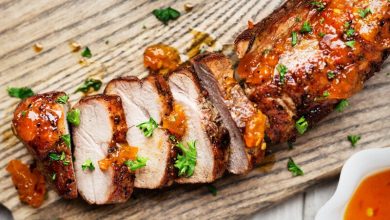🍤🥥 Asian Coconut-Milk Shrimp: A Delightful Culinary Journey 🍤🥥
What is it?
Asian Coconut-Milk Shrimp is a delectable and aromatic dish that combines succulent shrimp with a rich and creamy coconut milk sauce, infused with various Asian flavors. It’s a harmonious fusion of sweet, savory, and spicy elements that create a memorable dining experience.
History:
This dish is a contemporary creation that draws inspiration from various Asian cuisines, particularly Thai and Indian. Coconut milk has been a staple in these regions for centuries, and its creamy texture and mild sweetness complement seafood beautifully. Over time, creative cooks have experimented with different ingredients and techniques to develop this mouthwatering recipe.
Components:
- Shrimp: You’ll need fresh or frozen shrimp, peeled and deveined.
- Coconut Milk: For the creamy base of the sauce.
- Aromatics: Ingredients like garlic, ginger, and shallots.
- Spices: Common spices include red or green curry paste, cumin, coriander, and red pepper flakes for heat.
- Herbs: Fresh herbs like cilantro, basil, or lemongrass add depth to the flavor.
- Vegetables: Bell peppers, snow peas, or bamboo shoots are often used for a vibrant crunch.
- Fish Sauce and Sugar: To balance flavors with sweet and salty notes.
- Lime Juice: For a zesty kick.
- Cooking Oil: Typically, vegetable or coconut oil is used.
Steps to Prepare:
-
Marinate Shrimp: Toss shrimp with a bit of salt and pepper, and let it marinate while you prepare the sauce.
-
Prepare the Sauce:
- Heat oil in a pan over medium heat.
- Sauté garlic, ginger, and shallots until fragrant.
- Add curry paste and spices for extra flavor.
- Pour in coconut milk, fish sauce, and sugar, letting it simmer.
-
Cook the Shrimp:
- Add the marinated shrimp to the simmering sauce.
- Cook for a few minutes until they turn pink and opaque.
-
Add Vegetables:
- Toss in your choice of vegetables.
- Simmer until they become tender yet crisp.
-
Finish with Freshness:
- Stir in lime juice for a burst of freshness.
- Add chopped herbs, like cilantro or basil, for a final aromatic touch.
-
Serve: Plate your dish, garnish with more fresh herbs, and serve with steamed rice or noodles.
Preparation Time:
The preparation of this dish usually takes about 30-40 minutes, depending on your cooking experience. It’s a great choice for a mid-week dinner or a special occasion when you want to treat your taste buds to a delightful, flavorful journey.
Enjoy your Asian Coconut-Milk Shrimp adventure, and don’t forget to share the joy of cooking with emojis! 🍤🥥🍚🌶🍋🍃😋
📊 Nutrition Facts and Health Information for Asian Coconut-Milk Shrimp 🍤🥥
Here’s a breakdown of the approximate nutrition facts and some health information for this delicious dish. Please note that these values can vary depending on the specific recipe and portion sizes.
Nutrition Facts (Per Serving):
- Calories: Around 300-400 calories per serving, but this can vary based on ingredients and portion size.
Protein:
- Shrimp is an excellent source of lean protein, providing approximately 20-25 grams per serving.
Fat:
- Coconut milk adds richness but also contains saturated fats. A serving may contain around 20-30 grams of fat.
Carbohydrates:
- Carbohydrates are relatively low, mainly from the vegetables and a small amount of sugar. You might find about 10-15 grams per serving.
Fiber:
- Fiber content is typically low in this dish, at around 2-4 grams per serving.
Vitamins and Minerals:
- Coconut milk contains vitamins like C, E, and B vitamins, as well as minerals like potassium, magnesium, and iron.
- The vegetables used in the recipe can contribute additional vitamins and minerals, depending on your choice.
Health Information:
-
Protein: Shrimp is a great source of protein, which is essential for muscle growth and repair. It also provides essential amino acids.
-
Healthy Fats: Coconut milk, despite its saturated fat content, contains medium-chain triglycerides (MCTs), which are believed to offer various health benefits, including potential improvements in heart health and weight management.
-
Vitamins and Minerals: The dish can provide a variety of vitamins and minerals, especially if you include a diverse selection of vegetables. These nutrients are important for overall health and well-being.
-
Saturated Fat: While coconut milk adds creaminess and flavor, it’s high in saturated fat. Moderation is key, as a diet high in saturated fat can contribute to heart health concerns.
-
Caloric Content: The total calories in a serving can vary widely based on portion size and ingredients. It’s important to be mindful of portion control to manage calorie intake.
-
Customization: You can make this dish healthier by using light coconut milk or reducing the amount of coconut milk, which will lower the fat content.
Remember, the specific nutritional content of your dish may vary depending on the ingredients and cooking methods you use. If you have specific dietary concerns or restrictions, it’s always a good idea to consult with a healthcare professional or nutritionist to tailor the recipe to your individual needs. Enjoy your meal while keeping these nutritional aspects in mind! 🍤🥥📊😊



